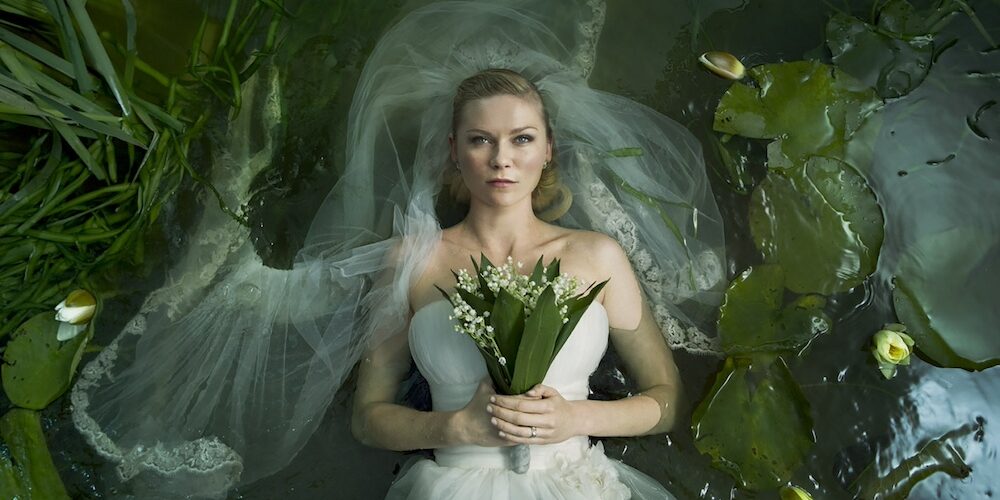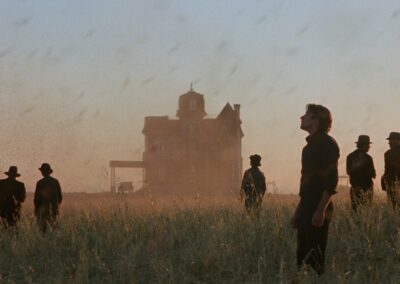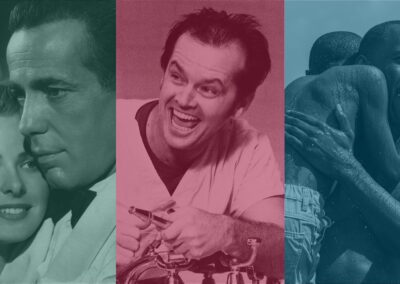Before he fell from grace so spectacularly, there was a time when Danish auteur and enfant terrible Lars Von Trier was turning out some of the most exciting movies to ever be made in Europe and now, guess what? He’s back (time tends to be a healer, doesn’t it?). Over the coming weeks, Ultimate Picture Palace cinema goers will have the chance to reappraise (or, if you’re a newbie, “get acquainted with”) some of his best works when they are being shown where they were designed to be seen: on a big screen, in the dark, in the company of others. And hotly debated, afterwards.
Whilst the short season of digitally re-mastered and 35mm prints, unfortunately, does not include his brilliant anti-musical Dancer in the Dark (2000), which starred the Icelandic singer Bjork in a rare starring role, or his most controversial film – the censor-baiting The Idiots (1998), it does include a couple that really are worth checking out (again).
Breaking the Waves (1996) was the film that really made his name (although his TV series The Kingdom had shown a great deal of promise) and is occasionally referred to as the first of his “golden hearts” films: movies in which women suffer but find some sort of salvation by being true to themselves and genuinely understanding what it means to love and be loved (something only a few of us are privileged to experience).
Here’s why this one merits your undivided attention.

Firstly, it more or less introduced film audiences to the talented British actress Emily Watson, who was nominated for an Oscar for her performance. Interestingly the role was originally given to Helena Bonham Carter, who dropped out. It was considered an extremely risk-taking performance in a film where most bets are off from the start.
Secondly, it’s a great tale: in the Scottish Highlands (the movie was shot largely on the Isle of Skye) in the 1970s, following an accident, a newly-wed disabled oil rig worker (Stellan Skarsgard) encourages his naive but devoted wife (Watson) to sleep with other men. Her devout faith leads her to believe that by doing this, she may be able to heal her partner. So she descends into the abyss and we go with her. There’s despair; self-laceration; hurt, pain and ultimately redemption. It’s a rollercoaster of the emotions and, once seen, is not easily forgotten.
Thirdly, the movie is shot by Robbie Muller who is, quite simply, one of the greatest modern cinematographers (his work also includes several films for Wim Wenders, notably Alice in the City, Kings of the Road and Paris, Texas; Alex Cox’ cult Repo Man; Friedkin’s To Live and Die in LA and Winterbottom’s 24 Hour Party People). Muller died aged 78 in 2018, leaving behind a body of work which continues to astound.
Arguably, it’s also Von Trier’s masterpiece which is a fourth, very good reason to book your seats.
Dogville (2003) has a fascinating theatrical premise and an outstanding cast (Nicole Kidman, Lauren Bacall, James Caan, Skarsgard [again] plus Ben Gazarra and more) and, like Waves, also deals with sexuality, sexual violence and how communities are not always a good thing.

The “theatricality” is based on the fact that the film is shot entirely in an empty studio, with almost no set or props. This minimalist, “Brechtian” approach (there are lines drawn on the floor to mark out characters’ homes and streets etc.) means that we are not distracted by anything other than the performances. You’ll either adore it or find it mind-numbingly pretentious. Or possibly both.
This time round, cinematographer Anthony Dod Mantle is on hand to call the shots and whilst it’s sparse, it’s also beautifully crafted. Mantle had shot the first Dogma 95 movie Festen in 1998 and subsequent work includes Slumdog Millionaire (2008); Pete Travis’ very good comic book adaptation Dredd (2012) and the James Hunt story Rush in 2013, amongst many others. The Dogma “movement” was another of Von Trier’s “intellectual pranks” – the idea being that films were shot on digital cameras; using natural light and with the director un-credited (a bit ironic, really, as films made under these “rules” came from Thomas Vinterberg and Susanne Biehr, amongst others, both of whom have gone on to established themselves as significant movie makers).
Von Trier and Mantle repeated the trick again with Manderlay in 2005 but somehow, a second time round, the impact was stunted. A proposed third part to the “trilogy” Washington went unrealised.
Melancholia, from 2011, is one of Von Trier’s three later films to feature another risk-taking actress Charlotte Gainsborough (as well as Kirsten Dunst at the top of her game, Stellan and son Alex Skarsgard and Kiefer Sutherland). It’s a hard one to summarise but basically it’s the end of the world as we know it and no one really feels fine. Or maybe they do?

The word “visionary” gets bandied around quite a lot when it comes to marketing movies and hyping up the latest emperor in new clothes (Tarantino, anyone?) but it’s a word I think is justly applied to Von Trier at his best. For a while there, he was turning out provocative, intelligent, challenging, devastatingly beautiful movies that felt transgressive and yet profound – usually at the same time.
There was certainly no one else doing anything remotely like this and cinemas in the late 90s and early 2000s were made all the more exciting by the prospect of a new movie coming from this director. He may well have been barking mad, arrogant, self-opinionated and boorish (there’s a huge backlist of off-screen “misjudgements” you can read about if you are so inclined – and many readers will be unable to separate the man from his work or wish to endorse someone who has often behaved abhorrently) but, in spite of these caveats, taken as a whole, his movies reveal (I think) a tender sensibility; an insight into human relationships; a willingness to talk about and show female sexuality in frank but not tawdry ways and, above all, an understanding of the capability of the film medium to be a genuine art form. Von Trier loved cinema and if you do, then you have to acknowledge Von Trier’s many achievements.
OK, it wasn’t all perfect (Anti-Christ, Nymphomaniac and his final film to date The House that Jack Built felt like he was cruising on empty) and as he now suffers from Parkinson’s it’s unlikely we will be seeing anything else from him in the future (again, detractors may be relieved).
But here’s your chance to take a look at some of the outrageous and challenging and superbly mounted films he made in his prime and judge for yourself.
Next month the UPP will be screening a retrospective of Powell and Pressburger’s much-loved and widely revered movies. The duo are considered to be amongst the best film makers this country has ever produced.
It’s worth remembering, however, that Michael Powell also fell out of favour when he directed Peeping Tom: a film that was hated on a scale that is still hard to believe, when it was first released in 1960.
Peeping Tom is now considered to be one of the greatest films ever made.
I rest my case.
For full listings and booking details on our Lars Von Trier classic season, click here.
Dr Andrew C Webber is a Film teacher and examiner with over 37 years’ experience. He currently contributes to both the Cinema of the 70s and 80s magazines (available on Amazon); cassette gazette fanzine (available from cassette pirate on e-bay) and the Low Noise music podcast available on Spotify and Apple podcasts.


